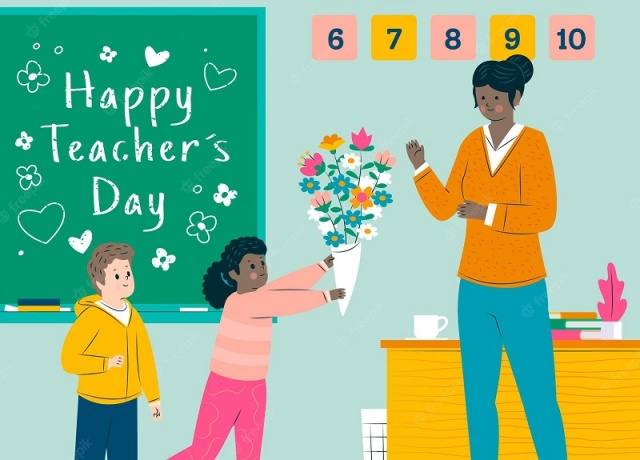Celebrating Teacher’s Day: Honoring the Architects of Knowledge
Every year,on September 10th,Teacher’s Day arrives like a gentle reminder to pause and appreciate the people who have shaped our lives in profound ways. Teachers are not simply professionals delivering information; they are mentors, guides, and often second parents who help us grow into capable, thoughtful, and compassionate individuals. Across the world, different countries celebrate Teacher’s Day on varying dates, but the underlying spirit remains universal—gratitude and respect for those who dedicate their lives to education.
In this article, I want to take you on a journey to explore the significance of Teacher’s Day, the history behind it, global traditions, and most importantly, the lasting impact teachers leave on generations of students. Along the way, I will also reflect on personal experiences and the broader lessons society can draw from honoring teachers, so that this day is not just ceremonial but truly meaningful.

The Meaning Behind Teacher’s Day
Teacher’s Day is more than just a formal event on the calendar. At its core, it is a celebration of knowledge, dedication, and the human spirit of nurturing others. When we thank a teacher, we are acknowledging not only their lessons but also the patience, creativity, and sacrifices that are invisible to most outsiders.
Imagine the countless hours teachers spend preparing lessons, grading assignments, staying after school for struggling students, or worrying about how to make a difficult concept accessible to everyone. Behind every moment of classroom success lies preparation and commitment. Teacher’s Day shines a spotlight on that hidden effort and reminds us of the immeasurable value education adds to both individuals and society.
Moreover, teachers are often role models. Long after we forget the exact details of a historical event or the solution to a math problem, we remember how a teacher made us feel—whether they encouraged us to persevere, treated us kindly during a tough day, or inspired us to dream bigger than we thought possible. Teacher’s Day, therefore, is not merely about “teaching” but about honoring the humanity that makes learning possible.
A Brief History of Teacher’s Day
The origins of Teacher’s Day differ depending on cultural and national contexts. In some countries, it is tied to religious figures, philosophers, or historical leaders, while in others it is connected to education reforms.
China: Teacher’s Day is celebrated on September 10, chosen in 1985 to honor the contributions of educators to society. It is a moment when students give flowers, cards, or small gifts to their teachers.
India: Teacher’s Day falls on September 5, the birthday of Dr. Sarvepalli Radhakrishnan, a respected philosopher, scholar, and former President of India. He believed that “teachers should be the best minds in the country.”
United States: While there isn’t a single national Teacher’s Day, the first Tuesday of May is recognized as National Teacher Appreciation Day, which falls within Teacher Appreciation Week.
UNESCO (World Teachers’ Day): October 5 is celebrated globally as World Teachers’ Day, marking the anniversary of the adoption of the 1966 ILO/UNESCO Recommendation concerning the Status of Teachers.
The diversity of dates reveals a universal truth: every culture acknowledges, in its own way, that teachers deserve recognition. Whether linked to a philosopher’s birthday or a global initiative, the intent is the same—gratitude for those who guide us.
Traditions and Celebrations Around the World
Teacher’s Day is celebrated with various customs, and each reflects how cultures perceive education.
China: Students often visit their teachers with cards and flowers, while schools may organize special assemblies. Retired teachers are also remembered.

South Korea: Known as Seonsaeng-nim-ui Nal (Teacher’s Day), it is observed on May 15. Students traditionally give carnations to their teachers, a symbol of respect and gratitude.
Thailand: Celebrated on January 16, students show respect by performing the wai khru ceremony, kneeling before their teachers to present flowers and pay homage.
Mexico: On May 15, known as Día del Maestro, schools often close, but parades, cultural events, and tributes to educators take place nationwide.
United States and Canada: While Teacher Appreciation Day may involve gifts or classroom surprises, broader campaigns emphasize policy support, better pay, and resources for teachers.
These traditions highlight two layers of Teacher’s Day: the personal gestures of gratitude from students and the collective responsibility of society to elevate and support the teaching profession.
The Role of Teachers in Society
Why do teachers deserve a day of recognition? Because their role is foundational to civilization. A teacher does not only impart knowledge—they plant seeds of curiosity, guide moral development, and prepare young people to face the challenges of adulthood.
Builders of Knowledge: Teachers provide the building blocks of literacy, numeracy, and critical thinking. Without them, progress in science, technology, and culture would be impossible.
Shapers of Character: Beyond academics, teachers often instill values such as integrity, responsibility, and empathy. For many children, a teacher’s encouragement can be the spark that shapes their future character.
Agents of Social Change: Teachers often stand at the frontlines of social issues—whether it is advocating for equality, encouraging girls to pursue education, or challenging harmful stereotypes.
Lifelong Mentors: Many students remain in touch with former teachers, seeking advice or simply sharing life updates. That ongoing relationship is proof of the trust and respect built in the classroom.
Personal Reflections: Teachers Who Made a Difference
Most of us have stories of teachers who left a lasting impression. I vividly remember my high school literature teacher, who had a passion for poetry that was almost contagious. She never forced us to memorize lines but instead asked us to feel them, to imagine the emotions behind the words. That changed the way I approached reading and, in many ways, shaped my love for writing.
Another memory comes from my math teacher, who refused to let me give up when algebra felt impossible. She stayed after class, patiently guiding me through each problem until the formulas started to make sense. To this day, whenever I face a daunting challenge, I remember her words: “You don’t have to be perfect, but you do have to keep trying.”
These stories are not unique to me; millions of students worldwide carry similar memories. Teacher’s Day is, in part, a collective diary of gratitude where each person recalls their own mentors.
Challenges Teachers Face
While Teacher’s Day is a celebration, it is also an opportunity to acknowledge the challenges educators face.
Workload: Many teachers handle overcrowded classrooms, long hours, and administrative tasks that extend beyond teaching.
Pay and Recognition: In many countries, teachers are underpaid relative to the importance of their role. The gap between their responsibility and their compensation remains a global concern.
Emotional Labor: Teachers often play counselor, mediator, and caregiver. They handle not only academic needs but also the emotional struggles of their students.
Adapting to Change: From digital learning platforms to shifting educational policies, teachers must constantly evolve. The COVID-19 pandemic underscored their resilience and creativity, as they moved classrooms online overnight.
Recognizing these challenges is part of truly honoring teachers—not only with flowers and words but also with structural support and reforms.
How We Can Truly Honor Teachers
While Teacher’s Day is a symbolic event, the deeper question is: how can we honor teachers every day?
Show Gratitude: A simple thank-you note, message, or gesture of appreciation can mean more than we imagine.
Support Education Policies: Advocate for better funding, smaller class sizes, and higher teacher salaries. Real respect comes not just from words but from actions.
Value Lifelong Learning: When we, as citizens, show a commitment to learning, we validate the work of teachers.
Preserve Their Legacy: Share stories of great teachers and highlight their contributions, so that their influence extends beyond the classroom.
Teacher’s Day in the Digital Age
In today’s interconnected world, Teacher’s Day is also evolving. Social media platforms are filled with heartfelt tributes, videos, and stories celebrating educators. Former students reconnect with teachers from decades past, while hashtags trend globally to honor mentors.
The digital era also allows us to recognize not only formal teachers but also informal ones—mentors, coaches, and online educators who shape lives in new ways. In this sense, Teacher’s Day is expanding, becoming more inclusive while retaining its central spirit of gratitude.
Conclusion: The Teacher’s Legacy
As we reflect on Teacher’s Day, it is clear that this celebration is not just about one profession but about the very foundation of human progress. Behind every scientist, artist, engineer, or leader, there stands a teacher who once nurtured their potential.
When we honor teachers, we honor the principle that knowledge is worth passing on, that wisdom is worth cultivating, and that compassion is worth teaching. Teacher’s Day is therefore not only about looking back with gratitude but also about looking forward with commitment—to support, respect, and uplift those who dedicate their lives to teaching.
To every teacher—past, present, and future—thank you. Your influence echoes far beyond the classroom walls, shaping not just students but entire societies. And that is a legacy worth celebrating, not only on Teacher’s Day but every day.




